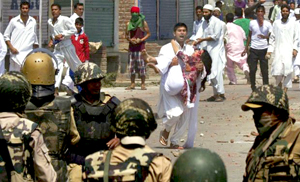 Jammu, Aug 11: Curfew was imposed in Udhampur district of Jammu and Kashmir on Sunday as a precautionary measure following violence and arson in Kishtwar district. The state administration has already clamped curfew in Jammu and Rajouri areas to avoid any untoward incident even as situation remains tense in the valley.
Jammu, Aug 11: Curfew was imposed in Udhampur district of Jammu and Kashmir on Sunday as a precautionary measure following violence and arson in Kishtwar district. The state administration has already clamped curfew in Jammu and Rajouri areas to avoid any untoward incident even as situation remains tense in the valley.
Attempts were made to set fire to two shops and two vehicles were torched in New Plot area of Jammu district, division commissioner Shant Manu said.
Curfew was imposed in the entire Jammu district following the incidents, he said.
Communal tension ran high in Rajouri district and curfew was imposed as a precautionary measure, SSP, Rajouri, Mubassir Lattifee said.
Jaitley to lead BJP team to violence-hit Kishtwar
BJP leaders, led by Arun Jaitley, will visit Kishtwar district today that has been affected by communal clashes, to make an on-the-spot assessment of the situation.
Jaitley, who is leader of opposition in Rajya Sabha, will be accompanied by Rajya Sabha MP from Punjab, Avinash Rai Khanna, and state BJP president, Jugal Kishore, during his visit. Kishtwar has been under curfew ever since the outbreak of clashes between two communities.
Taking the recent clashes seriously, the opposition party wants the situation to be brought back to normal soon.
The BJP fears that such clashes may lead to the repetition of the earlier situation that led to migration of members of a particular community from the state.
BJP president Rajnath Singh had spoken to Prime Minister Manmohan Singh and demanded early normalization of the situation in the affected areas. The PM had reassured him on the issue and told him that that Army had been called in.
Jaitley had also talked to finance minister P Chidambaram and the home secretary regarding the situation.
Three people were injured in an incident of firing in communal clashes in curfew-bound Kishtwar district which witnessed stray incidents of stone pelting, while another seven people, including a senior police officer sustained wounds in clashes. Teargas shelling and cane-charging was also witnessed in Jammu city.
Protests were held in Jammu and adjoining districts of region, which observed bandh in protest against the communal clashes in Kishtwar district.
Army troops patrolled the streets of the violence-hit district while the local administration advised people to remain indoors and not to violate prohibitory orders.





Comments
Add new comment